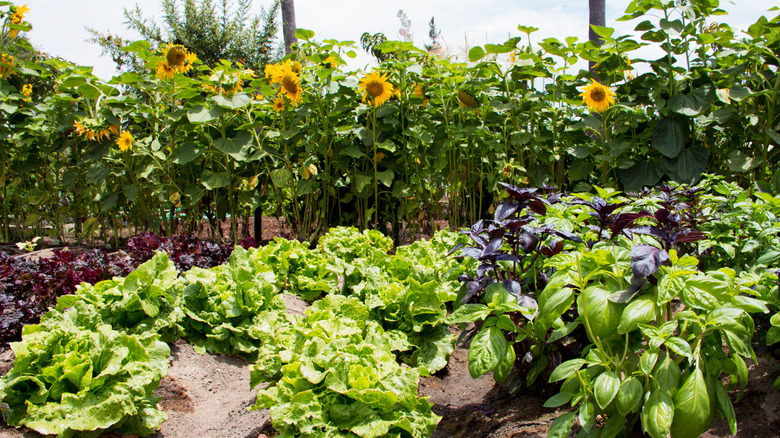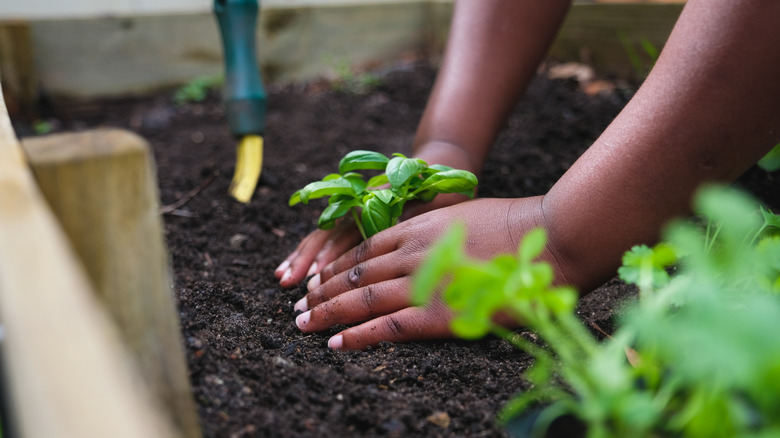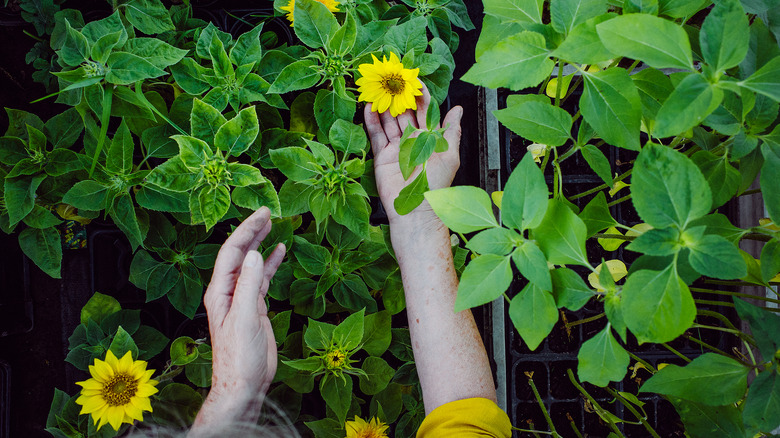The Benefits Of Planting Basil Near Your Sunflowers
A lot of people don't know that plants typically have friends just like we do. They are called companion plants because they grow well together and have a symbiotic or commensal relationship. Growing companion plants gives you more reasons to be happy because of the higher productivity. You get to utilize less yard space to grow multiple plants that help each other and reduce the stress of worrying about taking in a healthy yield. Plant friends nurture each other by providing benefits for one another. In the case of growing sunflowers, gardeners have figured out that they go hand in hand with basil.
When growing companion plants, you have to consider some factors that may influence which plants go side by side, including the their sun, shade, and water requirements. These have to be the same, for the most part, in order to complement each other. However, there are also instances where their opposing requirements can benefit each other, especially when it comes to sunlight. This is the case for sunflowers and basil and what makes them such great companions.
Sunflower shades basil while basil deters pests
Sunflowers are some of the most joyous plants ever because of their brightly-colored petals and how large they can grow. It's no wonder why people love to decorate their gardens with these yellow florals. One thing about sunflowers, though, is that they absolutely love the sun and even grow toward it, hence the name. However, basil prefers the shade. Because of this characteristic, sunflowers are able to shade the basil from the sun by towering over them with their size. Basil bolts when exposed to excess sun, which means the basil plant matures, produces flowers and seeds, starts to taste bitter, and eventually dies before any more leaves can be harvested. Therefore, by providing basil with shade, the sunflower keeps it from bolting.
In return, basil keeps hungry insects and other bugs away from the sunflowers, as this herb is a pest repellent that repels bugs like mosquitos and whiteflies. This is due to the natural oils that it contains such as citronellal and limonene which are also responsible for its flavorful aroma. Additionally, when basil flowers, it attracts pollinating agents like bees to it and any surrounding plants, including nearby sunflowers.
Common mistakes to avoid when planting sunflowers near basil
If you decide to go the companion planting method — which you absolutely should — and pair up your sunflowers with basil, then there are some common mistakes you should avoid making. Plants need nutrients from the soil to grow and produce flowers and seeds. When you pair sunflower and basil together, you have to take into consideration their individual nutrient needs and water requirements. Sunflowers sap up nutrients quickly and basil plants also have their fair share of needs, including moist but well-draining soil. Fertilizing and watering your soil regularly will give your garden the upkeep it needs to give you a great yield.
Also, don't plant your companions too close to each other, as plants need room to grow and their roots need space to breathe. Use their adequate spacing needs and projected maximum size as a guide for positioning them. Sunflowers are pretty big plants, so they may need to be placed a couple feet away from basil, but they should still be close enough to provide shade.
Another crucial mistake people make is not timing the harvesting of their companions. Basil leaves should be harvested regularly and the plant pruned to prevent it from bolting too soon. However, it needs to bolt in order to attract pollinators to the area so that the sunflowers can benefit from it. You'll need to time this correctly to get the most out of your companion planting experience.


